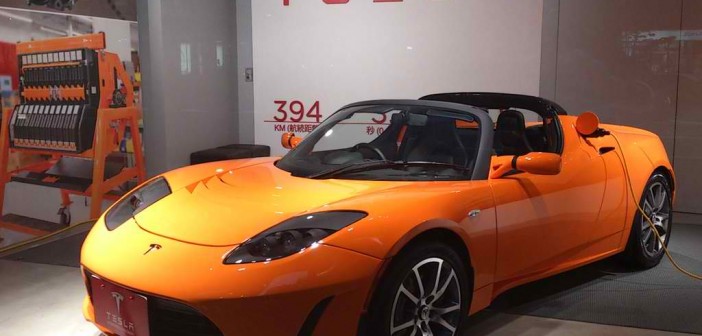Despite all of the successes and milestones Tesla Motors Inc (NASDAQ: TSLA) has achieved, there still remains one problem for the electric car marker to conquer. That is the issue of energy density.
Basically, energy density is defined as the amount of potential energy in a fuel source or energy source. It is Tesla’s crippling weakness right now.
Tesla vehicles currently use modern rechargeable lithium ion batteries. These batteries have an energy density between 0.9 megajoules and 2.63 megajoules per kilogram. This means that for each kilogram of energy in a lithium battery, it is capable of storing the equivalent of 0.252 to 0.736 hours of electricity in kilowatts.
Gasoline, in contrast, has an energy density of 34.2 megajoules per liter, which is equal to 9.57 kilowatts hours of electricity. What this means is that gasoline’s energy density is nine times that of rechargeable lithium battery. This is why a car that runs on gasoline fuel is able to run much further on a tank of gas that a Tesla can go on a charge of electricity.
Energy Density Explains The Lack of A Commercial Market For Tesla
There is no place in the commercial vehicle market for the electric auto maker precisely because of lack of energy density. Commercial vehicles would be forced to carry hundreds of pounds of lithium batteries to be able to go the same distance it could go on a tank of gasoline or diesel. It is this extra weight that prevents Tesla’s electric vehicles from entering the commercial vehicle business.
Specifically, companies like the United States Parcel Service (NASDAQ: UPS) will not be investing in electric vans anytime in the near future. An electric van would carry far fewer packages than a van that runs on gasoline. However, the company is using alternative fuel choices, including propane and liquefied natural gas (also known as LNG).
LNG has an energy density of 22.2 megajoules in a liter, or 6.2 kilowatt hours of electricity. A liter of propane has 25.3 as its energy density, which is equal to 7 kilowatt hours of electricity. Though these gases are not as energy dense as diesel, they are several times more energy dense than lithium ion batteries. For the sake of comparison, diesel fuel’s energy density is 37 megajoules, or 10.36 kilowatts of electricity.
The Challenge Of Fuel Cell Vehicles
Tesla faces major competition from Toyota Motor (NYSE: TM) and Honda Motor Company (NYSE: HMC), both of which will begin marketing fuel cell vehicles in California and overseas in Japan next year. The most recent fuel cell vehicles operate on compressed hydrogen, a gas that has an energy density of 5.6 megajoules a liter, which is the same as 1.57 kilowatts of energy. In other words, fuel cell vehicles have the same, perhaps a slightly greater, energy density of Tesla’s electric car.
The key point about fuel cell vehicles is that they emit no pollution. These cars use a chemical reaction, rather than an engine, to make electricity. Instead of smog, this reaction releases heat and water vapor. How could Tesla ever hope to compete with a vehicle that runs on a more energy dense fuel than an electric car does?
To add to the challenge, Toyota and Honda have the funds to spend on developing fuel cell vehicles – much more than Tesla can afford to spend on improving its lithium ion technology. Last quarter, Toyota reported $1.82 billion in free cash flow. That figure is almost as large as Tesla’s current revenue. Toyota’s TTM revenue is $256.26 billion, which is over 100 times Tesla’s revenue.
Honda’s revenue was $118.09 billion last quarter, with a negative cash flow of $1.9 billion. Both companies have enough funds available so that it can afford to invest in fuel cell technology without taking any significant financial risks.
Tesla clearly still has much to work on to be able to overcome the challenges ahead of it. When considering its energy density issues and its financial challenges, it’s not unlikely that Tesla shareholders will want out of the company.





Pingback: 1courtesy
Pingback: pork belly
Pingback: 86kub
Pingback: disposable
Pingback: sex 2024
Pingback: buôn lậu
Pingback: ซื้อทราย หาดใหญ่
Pingback: view coupons
Pingback: phim hanh dong
Pingback: ezybet
Pingback: 7bet Thai
Pingback: รีวิว fortune ox จากค่าย pg slot
Pingback: หวยใต้ดิน คืออะไร ?
Pingback: คลินิกเสริมความงาม
Pingback: cornhole wraps
Pingback: เดิมพันอีสปอร์ต Ku eSports
Pingback: Stream Super Bowl LIX
Pingback: Lauras Play Cotton
Pingback: ธุรกิจงานศพ
Pingback: วิธีเพิ่มยอดไลค์
Pingback: ไฟหน้ารถยนต์โปรเจคเตอร์
Pingback: top10casinosverige
Pingback: รับงาน
Pingback: read on
Pingback: ทัวร์ลาว
Pingback: Best Tailor in Bangkok
Pingback: 11HILO
Pingback: แฟรนไชส์หม่าล่าทั่ง
Pingback: รับทำตรายาง
Pingback: ddiyyala
Pingback: เน็ตบ้าน ais